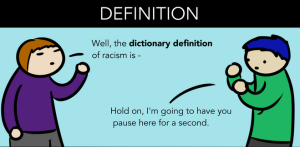(This article has been translated here in Spanish.)
“I’m Latino, I wish people would stop calling me white.”
“Aren’t all Latinxs People of Color?”
“If I’m Latina, how can I benefit from white privilege?”
Let’s be real: navigating ethnoracial identity as a Latinx in the United States can be confusing as hell.
Because even though we often associate the idea of a Latinx person with the image of a “brown person from Latin America,” racial identity for Latinxs is far more complex than that.
Latinidad – meaning both folks living in Latin America and those in diaspora – encompasses dozens of nations, cultures, and ethnoracial groups.
Latin America is one of the most ethnically and racially diverse regions in the world – each nation has it’s own specific history of slavery, colonization, and migration that creates different racial make-ups, tensions, and systems of oppression.
Because race is a social construct, it is viewed in a vast amount of ways across the Americas.
But what is the same is that white folks – starting with descendants of Spanish, French, and Portuguese colonizers – have always been in positions of power and capital.
The histories of white supremacy are rooted in the policies and ideologies of many of these countries and in Latinidad as a whole. Ideas such as mejorar la raza – “improving the race” – have praised whiteness and light skin since colonization.
White supremacy rules racial hierarchies, both in Latin America and amongst U.S. Latinidad.
Again, this is not to say that conceptions of whiteness are the same across Latin America and the United States. Each Latin American nation has its own categorizations for race that have to do with ancestry, skin tone, and class that is different than how many of us in the U.S. think about race.
But something that is similar in all of Latinidad is this: that if you are perceived as white, you are someone who benefits the most from power structures.
As Latinxs in the United States, we carry these legacies of white supremacy with us. In my experience as a mixed Afro-Puerto Rican, I’ve seen and experienced the ways in which whiteness is upheld, both because of the way race has been constructed in Puerto Rico and in the United States.
Why Is It So Important to Talk About White Latinx Privilege?
We need to be able to talk about this because of the ways in which white supremacy is a central oppressing force for Latinxs of Color both within and outside of our communities.
And I know it can be difficult to talk about. It’s easier to make sweeping statements like, “Talking about race is dividing us! We’re all one people! Viva la raza!”
But that’s not a particularly helpful attitude. It’s important to talk about the differences within our communities.
Because of the many different ethnoracial identities of Latinidad, we do not all navigate the world in the same way. Because whiteness is uplifted, both across Latin America and the United States, folks who are racialized as white have many more advantages and benefits than everyone else.
Even though you can be marginalized because you are Latinx, that does not erase the systemic white privilege you have because of your race.
I know it can be difficult to think about your privileges, especially when it’s directly harming your family members, friends, and other folks in your community. It can make you feel defensive or guilty that you benefit from something that you had no choice in.
I also know it can feel like talking about your whiteness is somehow erasing your Latinidad. I’ve often seen folks argue, “I’m discriminated against because people don’t believe that I’m Latinx.” I understand that this kind of personal erasure can be very hurtful.
Your race doesn’t determine whether you are “Latinx enough” or not.
However, your race does determine the kind of advantages that you are given on a systematic level, both within all Latinx communities and the broader United States.
It’s important to remember that white privilege is about automatically having advantages on multiple levels simply because of your race.
Once we as Latinxs really begin look at the ways in which white privilege deeply, negatively impacts everyone in our communities, we can begin to unlearn all the ideas that being white means that you’re harder working, smarter, more desirable, safer, and just straight-up better than everyone else.
Below are a number of examples for how you might benefit from white privilege as a white Latinx:
Historical Political Privilege
Across Latin America and the United States, there have historically been different policies and ideologies that have centered white populations at the expense of others. Overall, these policies have lead to the continued violence and erasure of anyone who isn’t white.
In particular, Black and Indigenous peoples in Latin America have born the brunt of white supremacist beliefs.
This is a problem because it completely erases how whiteness has been used as a tool of violence in our histories.
It completely diminishes the ways that things like colonization, slavery, industrialization, and militarization have protected and upheld white people at the expense of everyone else. The ideas behind these systems and policies still affect Latinidad today.
As a white Latinx, white privilege in terms of historical political privilege means that:
1. Chances Are That Most of Your Relatives Were Never Enslaved or Colonized
Of the 11.2 million enslaved Black people that were brought to the Americas, only about 450,000 were brought to the United States. Latin American countries like Brazil – which has the second largest Black population in the world – Haiti, Cuba, Puerto Rico, Panama, and Venezuela have huge populations that are descended from enslaved Africans.
Furthermore, since the conquistadors came to the Americas, Indigenous peoples were (and still are) enslaved, killed, assaulted, and raped. Indigenous activists such as Rigoberta Menchú talk about the oppressions that most Indigenous peoples in Latin America still face today.
2. No Government Has Ever Tried to Stop You from Having Children
Many countries have laws that literally try to make the population as white as possible.
Policies that support Blanqueamiento (literally, the biological “whitening” of the people) are rampant in Latin America. Particularly in the Caribbean, many governments and families encouraged folks to only reproduce with white or light skinned folks in order to have children that looked as white as possible.
3. Chances Are Your Family Had No Problem Migrating to Latin America
Across Latin America, European immigrants have historically been more welcomed than other immigrants. Nations like Brazil and Cuba not only welcomed European immigrants with open arms, they placed bans on “non-white” immigrants entering the country.
4. Violent, Racist Policies Have Protected Your Family
Many nations, such as the Dominican Republic, have had rampantly anti-Black policies that have lead to mass deportations and genocide. Unfortunately, these kinds of laws aren’t things of the past, either.
This past year, the Dominican Republic has continued to deport and abuse Haitian-Dominicans because of their Blackness.
5. Your Family Has Always Been Counted in Population Tallies
Some nations have been so eager to only represent white people that many Indigenous and Black populations have been deliberately undercounted or left out in government documents and statistics.
It wasn’t until 2015 that Afro-Mexicans were even included on the national census. Their most recent census reported that over 1.3 million Mexican folks self-identified as being of African descent.
Eurocentric Beauty Standards
Eurocentric beauty standards – meaning that the more white you look, the more beautiful you are deemed to be – is a huge problem in Latinx communities. Across the board, folks with straight hair, pale skin, slim noses, and light colored eyes are praised for the ways that they look above everyone else.
And while this isn’t a concept that’s only within Latinx communities, it is one that is constantly being reproduced in our families, neighborhoods, and through media.
White Latinxs, as the epitome of beauty, are often the only kind of positive representation in media across the Americas. Even though Eurocentric beauty standards tend to have a women-centric connotation, the idea of whiteness as perfection affects folks of all genders in Latinx communities.
Benefiting from Eurocentric beauty standards is an aspect of white privilege because:
6. You’ve Never Been Told That You Have Pelo Malo, or “Bad Hair”
This is one of the strongest examples of uplifting whiteness in Latinidad. Folks with longer, straighter and finer hair are praised; meanwhile those with Afro-textured, incredibly curly, and thick hair are teased and forced to spend hours trying to make our hair as straight as possible.
Straight hair meant looking – or being – more white, and is constantly valued in Latinx communities.
7. You’ve Never Been Told That You’re Too Dark To Be Beautiful, Successful, or Desirable
Along with the actual policies that have been used to physically whiten skin tones across Latinidad, there are many cultural norms that uplift pale skin above all else.
Children are still told to not date or marry anyone darker than them. Dark skinned Latinxs in the media are often Photoshopped or use bleaching creams to appear whiter as well.
8. You Resemble Latinx Celebrities Who Are Praised for Their Good Looks
Celebrities like Christina Aguilera, Cameron Diaz, or Bella Thorne are seen as beauty and fashion icons without being exoticized because of their whiteness. And while celebrities like this have been outspoken about their Latinidad, they seem to be much more accepted than brown and Black Latinxs have been in the media.
9. TV and Films Depict People Who Look Like You in More Positive Lights
I’m not only talking about non-Latinx white people of Hollywood, but within Latin American media as well. Beauty pageants, telenovelas, and news outlets are over-represented by white Latinxs and almost never show non-white Latinxs in staring or positive ways.
Representation in Culture and the Arts
Even though much of the vast cultures of Latinidad stem directly from marginalized traditions and heritages, white Latinxs still receive the majority of representation. In particular, West African and Indigenous American traditions are the cornerstone of so many aspects of the art of Latin America.
However, these histories are erased and traditions are divorced from the circumstances of struggle against white supremacy and seen as belonging to everyone in a particular ethnic group.
Furthermore, in the United States, the majority of stories that we get about Latinidad come from white Latinxs. This means that we, and non-Latinxs in the United States, only get a very narrow, specific point of view of Latinidad.
Instead of recognizing that Latinxs come from all different cultures, families, and histories, we continue to learn the same narrative about our peoples. More often than not, those narratives come from white Latinxs who have class privilege.
They are the ones who can quite literally afford to put their art out there, and whose works are consumable by mainstream media.
Representation in the arts is an example of white privilege because:
10. You Are More Likely To Be Recognized for Your Musical Talents
Despite the fact that many musical traditions, such as bomba, Latin jazz, and the tango, directly stem from the rhythms, beats, and music of enslaved Africans brought to Latin America, Black Latinxs are rarely in the spotlight.
With the exception of artists like Celia Cruz, most of the famous Latinx musicians to break into mainstream U.S. music are white or light-skinned.
11. You Are More Likely To Be Recognized in The Visual Arts
Famous Latinx artists like Frida Kahlo were directly inspired by Indigenous art traditions, but benefited greatly from their white heritage. Artists like Frida, while extremely important to many Latinxs, also have had protection because of their racial and class backgrounds.
Although Frida experienced oppression as a disabled woman, she was given many privileges because of the wealth of her mostly European ancestry. She had an access to education, healthcare, and money directly because of her whiteness.
Frida was able to adapt her art and style based off of Indigenous groups that did not have the same access that she had. Her work is renowned worldwide, while very much erasing the Indigenous peoples – many of whom are still around today – that influenced her work.
12. You Are More Likely To Be Recognized in The Literary Arts
White Latinx writers, although sometimes racialized as “brown” within the United States, still benefit from their from their affluent, European ancestors. These Latinxs, even though writing in diaspora, were often only able to pursue their crafts because of generational wealth from having educated, rich Spanish ancestry.
Julia Alvarez talks about this a bit in her essay, “A White Woman of Color.” Narratives similar to Julia’s – ones about Latinxs who were wealthy in their homeland, and then faced discrimination in the United States, before ultimately regaining wealth – are some of the only stories about Latinidad that is in the mainstream.
Freedom from Xenophobic and Racist U.S. Policies
While white Latinxs certainly can – and do – experience xenophobia once folks discover that you are not gringos, white Latinxs are rarely targeted when it comes to racist and xenophobic policies.
When you listen to the rhetoric and images that are used to stereotype and threaten Latinxs, it is not white Latinxs who are being attacked. Blackness especially is criminalized. We know this both within our communities and outside of it.
As folks who are white, you are usually read as non-threatening in the eyes of law enforcement and the government.
This, along with class privileges, also means that white Latinxs experience these kinds of policies in the same way that non-Latinx white folks do.
Policies that have forcibly sterilized, incarcerated, and deported Latinxs of Color have very rarely affected white Latinxs. Whiteness is a visible shield for you against policies that are based on physical appearance (and, connected to that, assumed citizenship status).
As a white Latinx, white privilege when it comes to U.S. laws means that:
13. You Are Less Likely To Be Viewed As Dangerous or Criminal by Law Enforcement
Specific laws like New York’s Stop and Frisk specifically target Black and brown folks, Latinx and not. According to the New York Civil Liberties Union, police stopped New Yorkers 45,787 times because of Stop and Frisk policies.
53% of folks stopped were identified as Black while 27% were identified as Latino. And when data uses “Latino” as a racial identity, chances are that it is speaking about Latinxs with brown and dark skin.
14. You Are Less Likely To Be Viewed as Undocumented by Law Enforcement
Arizona’s S.B. 1070 and other laws are based in racially profiling folks to determine citizenship status. Again, these kinds of laws specifically target folks who are viewed as non-white.
As the American Civil Liberties Union put it, “apart from appearance, it’s hard to imagine any way a police officer could suspect that someone was not in the country legally. What other factors would they use? Accent? Language? That they’re near another person who admits that he’s undocumented? That they “dress foreign?”
Benefiting from white privilege doesn’t erase your Latinidad.
But recognizing the ways in which white Latinxs do experience privilege is important when we think about the ways in which white supremacy is permeated in our communities. It gives us all a more nuanced look into our own histories, cultures, and positions of power.
It also helps us all to understand how much power whiteness is systemically afforded across the world.
Latinidad will never thrive if we continue to praise and uplift only whiteness.
Understanding your white privilege means you can begin to actively support the racially marginalized people within Latinidad. You can use your privilege in order to uplift the voices, experiences, and stories of Latinxs of color.
[do_widget id=’text-101′]
Jennifer Loubriel is a Contributing Writer for Everyday Feminism and a mixed race Afro-Puerto Rican from the Bronx. She is also a queer mujerista and child abuse survivor. She earned her B.A. from Oberlin College in Religion and English, and identifies as an amateur Latinx ethicist and a speculative fiction enthusiast. She is a co-founder and moderator over at the Tumblr Women of Color, in Solidarity, a safe space for and by women of color. You can usually find her writing about apocalypse and diaspora, rewatching her favorite TV shows, or taking selfies with her family’s cat.
Search our 3000+ articles!
Read our articles about:
Our online racial justice training
Used by hundreds of universities, non-profits, and businesses.
Click to learn more





















